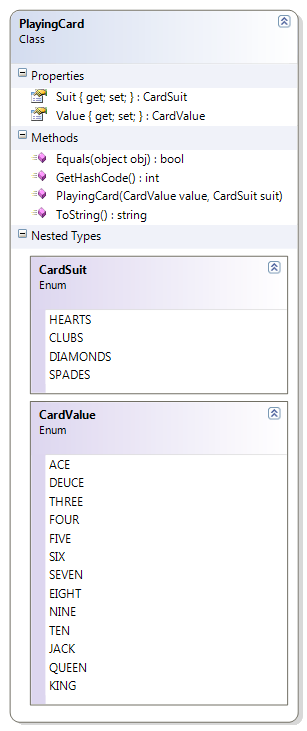# DeckOfCards
The DeckOfCards class represents a complete deck of cards. When the deck is first created, a card is created for each suit. The DeckOfCards supports a method to draw a card. The following methods must be coded to complete the solution.
- Constructor - Create all the cards for all the CardSuit values and all the CardValue values.
- DrawCard() - Return the card at the “top” of the deck (that is, at position zero). If the deck is empty, return a null.
- IsEmpty - Returns true if the logical size of the deck of cards has reached zero, otherwise it returns false.
- Supporting Classes
- PlayingCard - The PlayingCard class, along with its two enumerated types CardSuit and CardValue, are the basis for the DeckOfCards class.

public class DeckOfCards
{
private PlayingCard[] Cards { get; set; }
public int Count { get; private set; }
public bool IsEmpty { get { return Count == 0; } }
public DeckOfCards()
{
Cards = new PlayingCard[52];
foreach (PlayingCard.CardSuit suit in System.Enum.GetValues(typeof(PlayingCard.CardSuit)))
foreach (PlayingCard.CardValue value in System.Enum.GetValues(typeof(PlayingCard.CardValue)))
{
Cards[Count] = new PlayingCard(value, suit);
Count++;
}
}
public PlayingCard DrawCard()
{
PlayingCard card = null;
if (Count != 0)
{
// get the first card
card = Cards[0];
// "pull" the other items up in the array
for (int i = 0; i < Count - 1; i++)
{
Cards[i] = Cards[i + 1];
}
// "clear" the last element & adjust the count
Cards[Count - 1] = null;
Count--;
}
return card;
}
public void Shuffle()
{
for (int counter = 0; counter < 100; counter++)
{
int index = Rnd.Next(Count);
PlayingCard card = Cards[0];
Cards[0] = Cards[index];
Cards[index] = card;
}
}
}